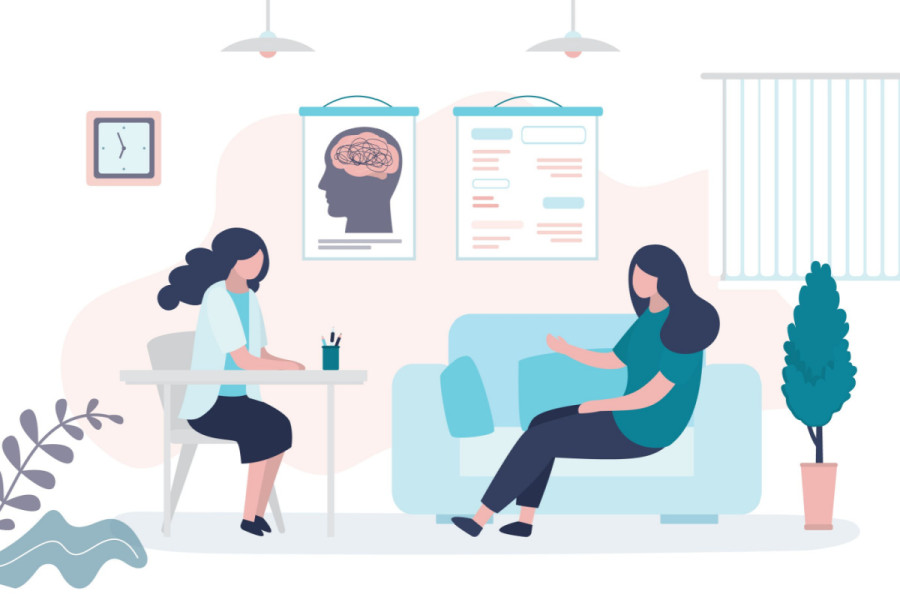Columns
Talking mental health
Individuals who open up about their mental health are called weak and those who suffer in silence deemed strong.
Rebecca M Shrestha
“So, can you read my mind?” This question is almost always raised whenever I tell someone I am a psychologist. While I am more than happy that I cannot read minds (or stars, for that matter), I have realised that many people would rather that I could. After all, this would mean that they would not have to express themselves or explicitly ask for help—a quick and silent fix is what most desire.
My interactions with Nepalis show that they are in a dire need for someone who understands and helps with their mental health problems, but they are hesitant towards tailored and thorough therapy. The issue starts with a general lack of awareness of what psychologists are and what they do. Psychologists, unlike psychiatrists, treat mental health disorders via verbal therapy. These therapy treatments, which require multiple sessions, generally last an hour each. “Eh, bolera?” Is a reply I usually get, along with a subtle hint of disappointment—“Ah, bolera!”
Speaking about one’s problems—especially mental health difficulties—which aren’t readily tangible is generally frowned upon in the South Asian culture. Individuals who open up about their mental health are called weak and those who suffer in silence deemed strong.
We fail to realise the strength and effort it takes to articulate what is going on inside our minds when we are struggling to comprehend ourselves. It is crucial to understand that it is okay not to be okay sometimes, and asking for help when needed displays insight and courage. After all, we are not machines–in fact, even machines need servicing. Moreover, we don’t think twice before going to a hospital when we need a physical check-up, do we?
This is because we have been taught to believe that, unlike physical health, mental health is closely linked to reputation and honour. The shame associated with having psychological difficulties and seeking therapy is rooted far deeper than what meets the eye. The concept of ijjat, the role this has in developing mental health disorders, and the barrier that this presents towards mental health help-seeking behaviour in South Asia have been thoroughly studied.
The pride that young individuals are expected to bring to their families by becoming engineers or doctors, by adult men who are meant to provide for their families day in and day out, and by women who are expected to adjust to living with their in-laws post-marriage are all non-negotiables in many families. Moreover, the road to attaining such pride is often expected to be linear, with no detours or mistakes. The pressure it brings about may form the basis for severe psychological stress, unhealthy coping mechanisms and mental health disorders.
Poor mental health literacy, denial and ignorance—“no one in our family has such a problem”—have robbed numerous individuals suffering from mental health disorders of their chance for recovery. Despite a dearth of research pertaining to mental health in Nepal, recent studies have revealed a steadily growing number of suicides and cases of depression and anxiety. A total of 25,316 people took their lives between 2015 and 2019—an average of 14 people each day—not to mention the numerous cases that go unnoticed or remain unrecorded, according to Bhagabati Sedain Silwal and co-authors in a 2021 paper titled “Burden of suicide in Nepal: an analysis of police records.” Furthermore, a national mental health survey conducted by the World Health Organization revealed that among 9,200 adults who participated, 10-20 percent were affected by common mental health problems. Among those affected, 78 percent did not seek any help to alleviate their symptoms. The leading cause of this lack of treatment was confusion about who to turn to and where to seek professional care.
So, with all this noise in their heads, who do people turn to? By default, these mental health issues are disclosed within friend circles and family. Often, it is met with statements like “You should not be so weak” and “What will others say if they find out?” Sufferers are left feeling even more lost and unsupported. This is where the role of a psychologist comes into play.
While family and friends undoubtedly have the best intentions in mind and in many cases also help alleviate some degree of psychological distress, there is a difference between family advice (helpers) and trained professionals (skilled helpers). Trained mental health professionals can assess, diagnose and provide evidence-based treatment for mental health disorders such as anxiety and depression while also providing coping strategies and stress management without the bias that people close to us may have. Their advice leads to better treatment outcomes and sustained recovery. “Why spend money on this?” is an argument I have often heard. To put it bluntly, seeking help for our mental health from mental health professionals is comparable to how we would go to a medical doctor and not our engineer uncle to treat diabetes.
Having said this, I understand that humans are creatures of habit, and change, even if pleasant, can often be difficult to initiate. Asking for help when one has mental health issues is that change. Support may be obtained from those close to us. But more often than not, this is not enough. Regrettably, the majority of the population is limited to this resource for support. Thankfully, in larger cities in Nepal, there is a steady rise in the number of psychologists in public and private hospitals as well as psychology clinics.
Asking for help when feeling helpless is not a sign of weakness. It takes great strength and bravery to admit that we need support. By accepting this, we take the first step towards achieving a balanced state of physical and mental wellbeing.




 14.24°C Kathmandu
14.24°C Kathmandu















